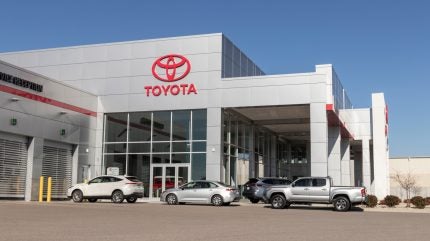
Toyota Motor is weighing plans to bring American-manufactured models into the Japanese market, public broadcaster NHK reported.
The news came ahead of US President Donald Trump’s visit to Japan this week.

Discover B2B Marketing That Performs
Combine business intelligence and editorial excellence to reach engaged professionals across 36 leading media platforms.
Trump is scheduled to meet Japanese business leaders during a three-day visit beginning today (27 October).
As per the report, Toyota is preparing for Toyoda to communicate the company’s import plan to US officials.
Toyota president Sato Koji told reporters that the company is considering importing models manufactured in the US.
The automaker is assessing which models and the volumes that could be shipped to Japan.
The move follows a trade deal reached with Washington in July that affects tariffs on products imported to the US from Japan.
The government of Japan has been reviewing regulatory changes to permit the sale of US-made vehicles to be sold in Japan without further testing.
Japanese public and private sector actors are seeking to show cooperation with Washington in efforts to lessen the US trade deficit with Japan.
Separately, Toyota’s recent sales figures show modest growth overseas alongside declines in the domestic market.
For August 2025, the group reported global sales of 900,598 vehicles, up 1.2% year on year and including Daihatsu and Hino, with overseas sales rising 3.7% to 766,151 units while sales in Japan fell more than 10% to 134,447 units.
In July 2025, global sales were 963,796 vehicles, up 4.2% year on year, with overseas sales up 5.9% to 782,037 units and domestic sales down 2.3% to 181,759 units.
The move coincides with fresh warnings that Japan’s carmakers could face renewed chip supply constraints, following the Dutch government’s takeover of Nexperia BV, the Netherlands-based unit of China’s Wingtech Technology.
In response, Toyota, Honda, and Nissan are reassessing their procurement plans, and both Volkswagen in Germany and Ford have been cautioned to prepare for possible semiconductor shortfalls.






